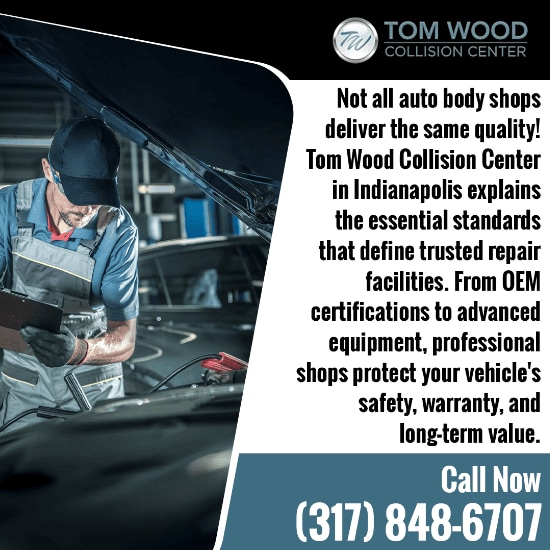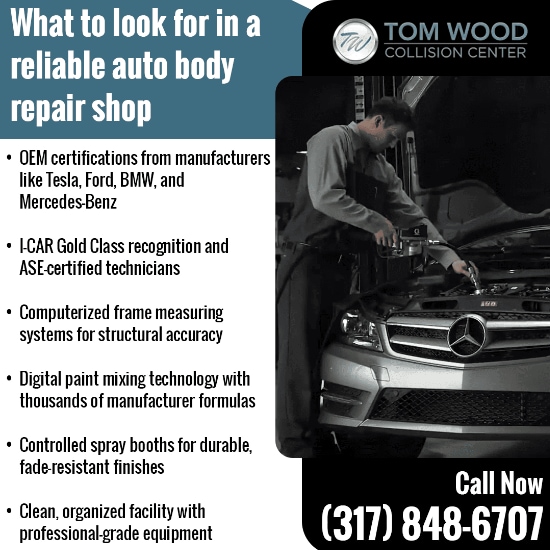Finding a reliable auto body repair shop near you requires understanding what separates professional facilities from basic repair services. The wrong shop choice can compromise vehicle safety, reduce resale value, and create ongoing problems that exceed original repair costs. Indianapolis drivers face unique challenges with winter road salt, construction debris, and urban parking hazards that cause frequent vehicle damage. Tom Wood Collision Center understands these local challenges and provides manufacturer-certified auto body repair in Indianapolis. Our systematic approach to collision restoration, combined with modern equipment and certified technicians, delivers the reliability and quality that modern vehicles demand.

Identifying Professional Auto Body Repair Shops
Professional auto body repair facilities demonstrate quality through measurable standards and industry recognition. These shops invest in certifications, training, and equipment that deliver consistent results. Three primary indicators separate professional operations from basic repair services.
Manufacturer Certifications
Major vehicle manufacturers operate certification programs that validate repair capabilities. Certified shops follow exact manufacturer specifications for your repairs. For example, Tesla's approved body shop network requires specialized equipment and extensive training. Similarly, Ford Motor Company requires shops to complete 40 hours of annual training to maintain certification status. BMW, Mercedes-Benz, and Audi maintain particularly rigorous certification requirements that few collision facilities achieve nationwide.
Industry Training Standards
I-CAR (Inter-Industry Conference on Auto Collision Repair) provides collision-specific education throughout North America. I-CAR Gold Class recognition requires shop staff to complete role-relevant training annually. This designation indicates commitment to professional development and current repair techniques, making it a valuable credential when evaluating potential shops.
ASE (Automotive Service Excellence) certification covers specific repair specialties, including painting, structural analysis, and damage estimation. Look for shops where technicians maintain these credentials through continuing education requirements.
Equipment Requirements
Modern auto body repair requires sophisticated equipment that delivers precision and consistency for quality results. Computer-controlled frame straightening systems represent significant investments that separate professional operations from basic repair facilities. Quality collision repair demands computerized paint mixing technology for precise color matching on your vehicle. These systems store thousands of paint formulas and adjust for vehicle age and environmental factors.
Professional spray booths maintain specific temperature and humidity levels required for quality paint application. When selecting an auto body repair shop near you, avoid facilities using improvised painting areas that cannot control environmental variables affecting your repair's finish quality.
Research Methods for Finding a Trusted Auto Body Repair Shop Near You
Effective research combines multiple information sources to evaluate auto body repair shop capabilities. Online reviews, professional referrals, and facility inspections each provide different perspectives on shop performance. Three research approaches provide the most valuable information.
Online Review Analysis
Google Business profiles display recent customer experiences and shop responses to feedback. Reviews from the past 12 months carry more weight than older feedback. Filter for specific details about repair quality, communication, and timeline accuracy. Look for patterns across multiple review platforms. Pay attention to how shops respond to customer feedback, as professional responses indicate commitment to customer satisfaction and problem resolution.
Insurance Networks
Insurance companies work with auto body repair shops to streamline claims processing and provide convenient service to their customers. Many insurers maintain preferred provider networks that offer benefits like direct billing and faster claim approvals. These relationships can simplify your repair experience through coordinated communication and payment processes.
However, you retain the right to choose any licensed repair facility regardless of insurance recommendations. Professional auto body repair shops work effectively with all major insurance companies, understanding their requirements and documentation needs to process your claim efficiently.
Professional Referrals
Automotive professionals frequently interact with collision repair facilities and can provide valuable insights about shop capabilities. Dealership service advisors regularly see vehicles after collision repairs and can identify which shops consistently deliver quality work. They notice details like paint matching accuracy, panel alignment, and overall workmanship that affect customer satisfaction. Independent mechanics and automotive service providers often refer collision work to trusted shops based on their professional relationships.
Facility Evaluation Criteria
Direct evaluation reveals shop capabilities that online research cannot provide. Facility visits allow assessment of equipment, organization, and staff professionalism. Schedule appointments during business hours to observe normal operations.
Physical Facility Assessment
Clean, organized work areas indicate attention to detail that translates to repair quality. Professional auto body repair shops maintain tool organization systems and designated storage areas for parts and materials. Modern spray booths feature computerized controls for temperature, humidity, and air flow. Equipment used should be current and well-maintained.
Staff Qualifications
Meet the technicians who would work on your vehicle and ask about their training backgrounds. I-CAR certified technicians display current credentials that specify their areas of expertise. Estimators should hold appropriate certifications for damage assessment and parts identification. Complex modern vehicles require extensive knowledge of construction methods, materials, and repair procedures from qualified staff.
Quality Control Systems
Professional auto body repair shops implement systematic quality control procedures at multiple stages. Final inspections use checklists that cover paint quality, panel alignment, and safety system function. Electronic diagnostic equipment confirms that airbag, stability control, and other systems operate within specifications. Paint thickness gauges verify proper application depth. This specialized equipment enables precise quality verification that distinguishes professional facilities from shops using basic inspection methods.
Understanding Repair Estimates
Detailed estimates reveal shop professionalism and help you identify reliable auto body repair facilities. Accurate estimates require thorough damage assessment and knowledge of current repair procedures. Shops that provide well-documented estimates demonstrate expertise and transparency that indicate reliable service.
Cost Components
Labor charges reflect the time required for specific repair procedures using industry-standard databases. Parts costs vary between OEM (Original Equipment Manufacturer) and aftermarket alternatives. Premium paint systems provide superior durability compared to economy alternatives.
Material costs include paint, primer, clear coat, and consumables. Understanding these components helps you compare estimates effectively and identify an auto body repair shop near you that uses quality materials versus those that cut corners.
Repair Methods
Different types of vehicle damage require specific repair approaches that affect both quality and timeline. For example, paintless dent repair (PDR) removes dents without painting when paint remains intact. PDR maintains original factory paint while costing less than conventional repair methods. This technique works for hail damage, door dings, and minor impact dents. Conventional bodywork involves metal straightening, filler application, and complete panel refinishing. Panel replacement becomes necessary when damage exceeds repair limits. Reliable shops recommend the most appropriate method for your specific damage type.
Red Flags to Avoid
Certain warning signs indicate shops that may deliver poor results. Professional shops operate transparently and welcome customer questions about their processes. Four critical warning signs require immediate attention.
Pricing Concerns
Extremely low estimates often indicate corner-cutting that compromises repair quality. Shops offering prices much below market rates typically use inferior materials or skip essential procedures. Same-day completion promises for extensive damage indicate unrealistic timeline expectations.
Insurance and Licensing
All collision repair facilities must maintain current business licenses, liability insurance, and workers' compensation coverage. Uninsured shops create liability risks for customers if accidents occur during repair. Request current insurance certificates rather than accepting verbal assurances.
Communication Issues
Poor communication during initial contact often indicates ongoing customer service problems. Reliable shops return phone calls promptly and provide clear information about services. Reluctance to provide written estimates or explain repair procedures indicates transparency issues.
Documentation Problems
Pressure to sign blank repair orders creates opportunities for disputes. Professional documentation includes complete damage descriptions, repair procedures, parts specifications, and timeline estimates.
Tom Wood Collision Professional Standards for Auto Body Repair in Indianapolis
Finding reliable auto body repair near you becomes simpler when you understand what true professionalism looks like in collision restoration. At Tom Wood Collision in Indianapolis, we exemplify the industry standards that separate exceptional service from ordinary repair work.
Precision-Driven Repair Technology
Your vehicle deserves restoration technology that matches modern manufacturing standards. Our facility houses computerized paint matching systems that analyze your vehicle's exact color formulation, accounting for fade patterns and environmental exposure. These systems eliminate guesswork and deliver seamless color integration.
Frame alignment accuracy determines your vehicle's safety and handling characteristics. We employ laser-guided measurement systems that detect structural deviations within millimeters, restoring your vehicle's geometry to original specifications. This precision protects your investment and maintains manufacturer safety standards.
Commitment to Proper Procedures
Auto body repair expertise extends beyond equipment to understanding vehicle construction methods across different manufacturers. We maintain OEM certifications from leading automotive manufacturers, validating our ability to follow exact factory repair procedures. These certifications demonstrate our commitment to maintaining structural integrity and safety system functionality according to original design specifications.
Our technicians hold I-CAR certifications that cover collision-specific repair techniques and safety procedures. ASE certifications in our team validate specialized knowledge in painting, structural analysis, and damage assessment. These credentials require ongoing education and renewal to stay current with industry standards.
Electric vehicles, advanced high-strength steels, and integrated safety systems require specific repair approaches that many facilities cannot provide. Our certified technicians regularly update their knowledge through manufacturer training programs that address these evolving automotive technologies.
Results-Focused Service Approach
Your satisfaction depends on transparent communication and delivered results. We provide regular progress updates and explain repair procedures in understandable terms. Quality workmanship speaks through finished results, not promises or guarantees.
Post-repair vehicle performance should match or exceed pre-accident conditions. Our systematic inspection processes verify that paint finish, panel fit, and safety systems meet professional standards before we consider any repair complete.

Choosing Professional Auto Body Repair with Confidence
Selecting a reliable auto body repair shop near you protects your investment and maintains your vehicle's safety and integrity. The research you conduct today determines whether your repair experience delivers professional results or creates ongoing frustrations. Quality shops distinguish themselves through certifications, equipment investments, and transparent communication that builds customer confidence.
Your vehicle represents both transportation and a financial investment that deserves professional restoration when damage occurs. Take time to evaluate potential auto body repair shops using the criteria outlined in this guide. The right partnership with a reliable repair facility provides peace of mind and quality results that preserve your vehicle's value for years to come.
Contact Tom Wood Collision at (317) 848-6707 for professional auto body repair in Indianapolis. We serve Indianapolis, Carmel, Fishers, Noblesville, and surrounding areas with auto body repair services that demonstrate a genuine commitment to quality craftsmanship.

